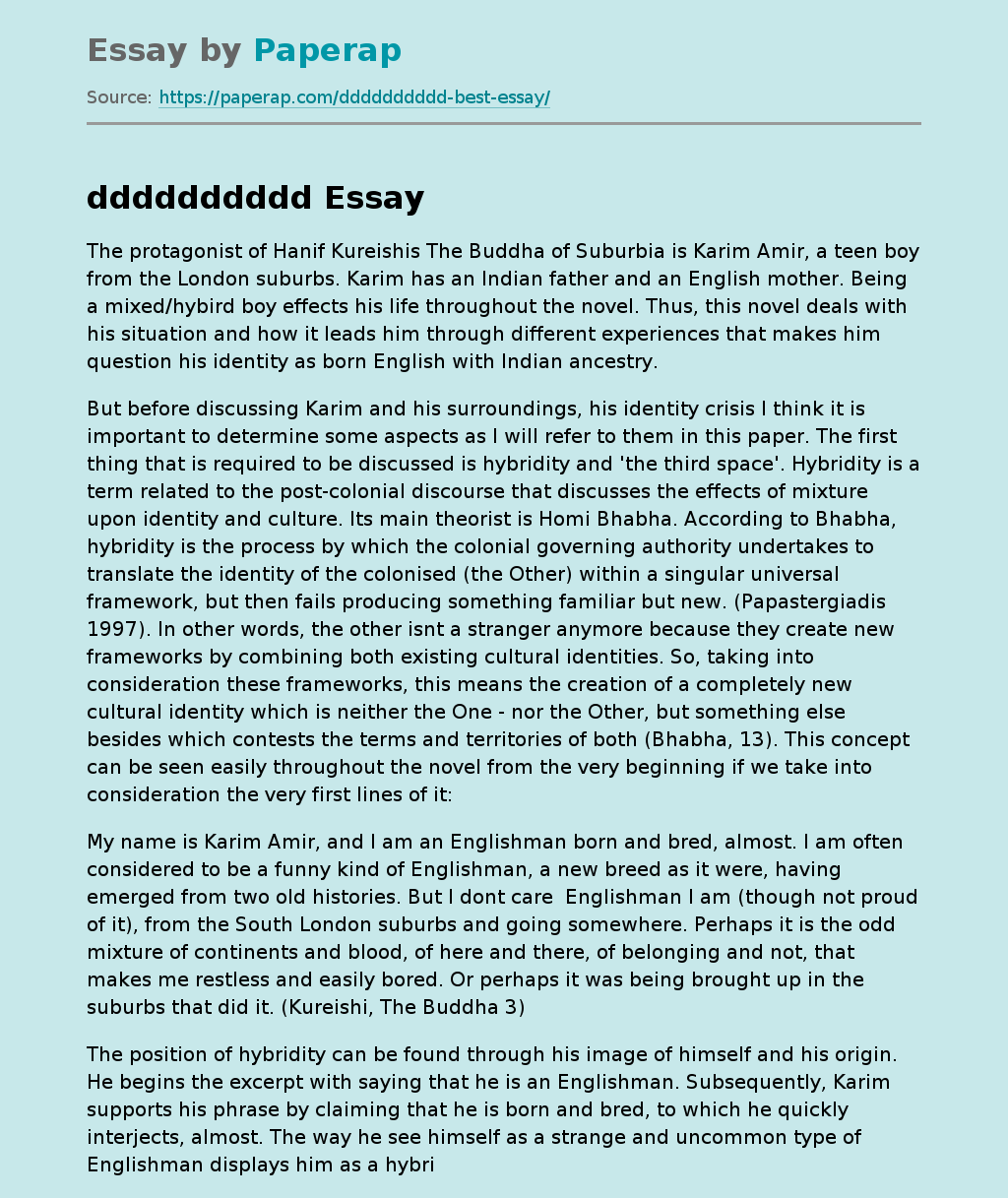"The Buddha of Suburbia"
The following example essay on “The Buddha of Suburbia” is an analysis of a literary work by Hanif Kureisha. The essay reveals the plot of a fascinating novel about a young half-Indian, half-Englishman who is desperately looking for his place in life, named Karim Amir.
The protagonist of Hanif Kureishis The Buddha of Suburbia is Karim Amir, a teen boy from the London suburbs. Karim has an Indian father and an English mother. Being a mixed/hybird boy effects his life throughout the novel.
Thus, this novel deals with his situation and how it leads him through different experiences that makes him question his identity as born English with Indian ancestry.
But before discussing Karim and his surroundings, his identity crisis I think it is important to determine some aspects as I will refer to them in this paper. The first thing that is required to be discussed is hybridity and ‘the third space’. Hybridity is a term related to the post-colonial discourse that discusses the effects of mixture upon identity and culture.
Its main theorist is Homi Bhabha. According to Bhabha, hybridity is the process by which the colonial governing authority undertakes to translate the identity of the colonised (the Other) within a singular universal framework, but then fails producing something familiar but new. (Papastergiadis 1997).
In other words, the other isnt a stranger anymore because they create new frameworks by combining both existing cultural identities. So, taking into consideration these frameworks, this means the creation of a completely new cultural identity which is neither the One – nor the Other, but something else besides which contests the terms and territories of both (Bhabha, 13).
This concept can be seen easily throughout the novel from the very beginning if we take into consideration the very first lines of it:
My name is Karim Amir, and I am an Englishman born and bred, almost. I am often considered to be a funny kind of Englishman, a new breed as it were, having emerged from two old histories. But I dont care Englishman I am (though not proud of it), from the South London suburbs and going somewhere. Perhaps it is the odd mixture of continents and blood, of here and there, of belonging and not, that makes me restless and easily bored. Or perhaps it was being brought up in the suburbs that did it. (Kureishi, The Buddha 3)
The position of hybridity can be found through his image of himself and his origin. He begins the excerpt with saying that he is an Englishman. Subsequently, Karim supports his phrase by claiming that he is born and bred, to which he quickly interjects, almost. The way he see himself as a strange and uncommon type of Englishman displays him as a hybrid. He obviously recognizes his hybridity by accepting that he emerged from two old histories.
Shortly after, he doesnt care about his hybridity and we see this when he says : but I dont care. His approach to reject his hybridity confirms Bhabhas concept of hybridity being susceptible to a split of identity through his inability to recognize himself as more than just an Englishman. As it is seen, Karim discovers his problems with this Indianness, however, sometimes he feels himself close to Indian people such as Jamila and Changez. He is partly an Indian, one who is born and bred in a London.
But I did feel, looking at these strange creatures now the Indians that in some way these were my people, and that I?d spent my life denying or avoiding that fact. I felt ashamed and incomplete at the same time, as if half of me were missing, and as if I?d been colluding with my enemies, those whites who wanted Indians to be like them.Partly I blamed Dad for this. After all, like Anwar, for most of his life he?d never shown any interest in going back to India… So if I wanted the additional personality bonus of an Indian past, I would have to create it. (Kureishi, The Buddha 212-213).
At this point, he starts to understand that there is a part of him that he does not really have any idea about it and that there is a part of his identity that it is present but he is not capable of knowing it yet, and it is an important consideration to go through his identity journey. Karim feels that he cheated on the Indianness inside him by not approving his Indian roots. He portrays the Indians as strange creatures, and the difference between him and his origins culture seems impassable. This kind of feeling has everything to do with the absence of someone who can take him by the hand and directs him through the Indian culture which is indeed one half of him. Because of this reason, he justifiably says that he will have to create it himself, hit the road to his Indianness trusting in the first place on his own strength and willingness to discover.
"The Buddha of Suburbia". (2019, Nov 16). Retrieved from https://paperap.com/dddddddddd-best-essay/

